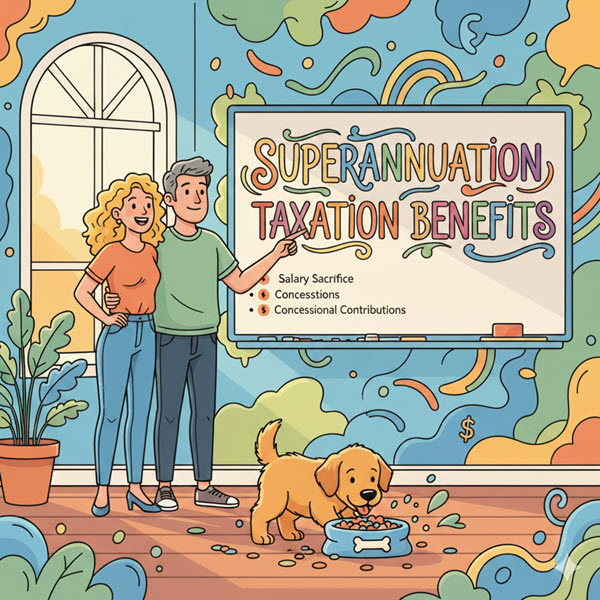A summary of Rules applying to your Superannuation
Superannuation can be daunting, which is why so many people fail to engage with it, blindly trusting their fund manager to be making sure their customers are getting the best possible performance. Reality? They probably aren’t. Anyway, that’s a story for another page. This page is about simplifying the rules that apply to your superannuation account.
- Australians can access their super from age 60 if they’ve permanently retired from the workforce, or at age 65 even if still working.
At that point, your account switches from the ‘accumulation phase’ to the ‘retirement or pension phase’. This has some worthwhile benefits.- No tax on capital gains
- No tax on dividends
- Tax free drawdowns
Taxation of Superannuation
The tax treatment of contributions to a superannuation fund and that of earnings in the fund make it an extremely tax-friendly vehicle in which to build wealth. Examples here will be based on an employee with a nominal income of $135k pa. This income is subject to a marginal taxation rate of 30, with incomes above this up to $190k facing a 37% marginal rate
- Employers are bound to contribute 12% of their employee’s salary as a ‘Superannuation Guarantee’ (SG) payment since 1 July 2025. This has been rising over the past few years, but this is the end of the line for planned increases.
- Contributions to superannuation receive a taxation concession, up to a limit of $30k per year. These contributions are taxed at just 15% rather than the employee’s marginal tax rate, So paying half or even less of the taxation normally applicable to income is significant.
- In 2024, our model employee would receive a SG payment of $15,525. This leaves $14,475 available to contribute to one’s Super Fund at the concessional rate of 15% tax. If one could confidently invest extra funds until retirement, it would generally be beneficial to take this tax advantage and contribute extra funds to super rather than paying off the mortgage which costs around 6% pa. There are caveats to this which will be discussed separately.
- One can make additional deposits to their fund, however only that first $30k receives a tax concession. The annual cap for non-concessional contributions is $110,000. Individuals under 75 can bring forward up to three years’ worth of contributions (i.e., $330,000).
- Once in Retirement Phase, super fund withdrawals are generally tax free. Given that our $135k income was reduced by tax of just over $28k, a withdrawal of around $97k would yield the same purchasing power. The tax-free income from super is a remarkable gift!
- The treatment of a superannuation balance upon death is not considered part of one’s normal assets, and careful estate planning is required to ensure funds are distributed as desired. This is not automatic!
Superannuation Fund Contributions.
If you have no investment skills or knowledge, then probably just leave the decisions around your industry or Self Managed Super Fund (SMSF) to the fund managers. If however you have some skills and awareness of the market turmoil, you may have a feeling about the nature of how the situation will play out.
- Consider taking control of your super fund. Unless you have a professioanl manager on board looking after your hand-crafted portfolio, the big funds will likely just keep buying shares when your monthly contribution arrives. While right now they are buying at a modest discount, you may or may not want them to do that, preferring to accumulate cash until things settle. So you may care to step in.
- Similarly, if you are making salary sacrifice contributions, you migh want to hold them off and make the deposit to your super fund at a time of your choice.

